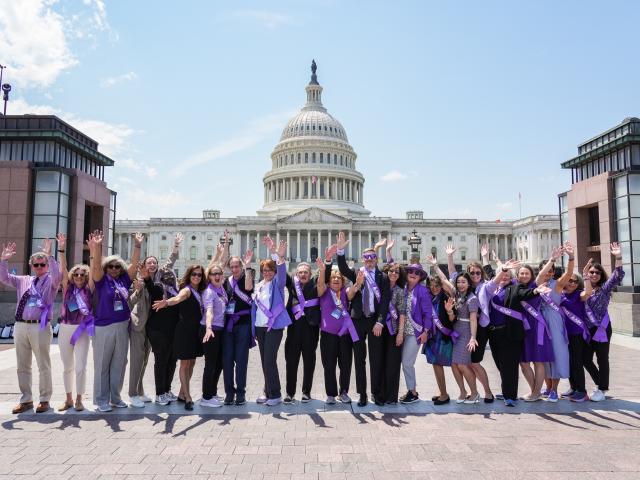WASHINGTON, D.C., August 2, 2017 - The National Institutes of Health (NIH) requested in its professional judgement (bypass) budget a $597 million increase in Alzheimer's research funding for FY2019. The announcement came during the meeting of the Advisory Council on Alzheimer's Research, Care and Services. This is the third-ever professional judgment budget released by the NIH, following the enactment of the Alzheimer's Accountability Act in 2014.
Alzheimer's is the only leading cause of death that cannot be prevented, cured or even slowed. Only scientific breakthroughs will change this. The additional funding requested by the NIH would directly support research identified by leading scientists to meet the 2025 prevention and treatment goal established by the National Plan to Address Alzheimer's Disease. The NIH stated the additional funding "would allow us to capitalize on and accelerate the important scientific advances we are making against these devastating disorders."
"Today's request, combined with the recent historic action taken by Congress, clearly demonstrates the growing threat of Alzheimer's to our nation, and the determination of the research community to end this crisis" said Robert Egge, Alzheimer's Impact Movement (AIM) Executive Director. "In recommending this increase, the NIH has identified a roadmap towards scientific breakthroughs that will lead to a way to prevent, treat, or cure Alzheimer's."
Congress has shown leadership with substantial increases in funding over the last few years. This budget offers a complete picture of the critical additional funding needed for research in the coming year, and provides important context--the devastating toll Alzheimer's is taking on people living with the disease, the health system and the economy."
In releasing the budget, Dr. Francis Collins, director of the NIH said the "NIH hopes to continue to build the scientific foundation for the future. Increased investments in research will allow us to further expand our knowledge base and provide vital support for the scientific infrastructure of people and technology for the Alzheimer's and related dementias research enterprise. Some of the sharpest and most creative scientific minds are at work to fight these conditions, and we must do everything we can to maintain their focus."
Following two years of historic increases, today federal research funding for Alzheimer's and related dementias is $1.4 billion. Earlier this month, the House Appropriations Committee approved an additional $400 million increase for FY2018, and the Senate is expected to take action in September.
Alzheimer's is only the third disease - after cancer and HIV/AIDS - to have a professional judgement budget. This budget is the direct result of the Alzheimer's Accountability Act, which directs the NIH to submit to Congress the annual resources needed to accomplish the National Plan to Address Alzheimer's Disease goal to prevent and effectively treat Alzheimer's by 2025. The Alzheimer's Association and AIM were the sole groups supporting the passage and enactment of the Alzheimer's Accountability Act.
At a cost of $259 billion in 2017, Alzheimer's is the most expensive disease in the country, and barring any medical breakthroughs the Alzheimer's Association estimates this cost could rise to over $1 trillion annually by 2050.
For more information on Alzheimer's disease, visit the Alzheimer's Association at alz.org.
